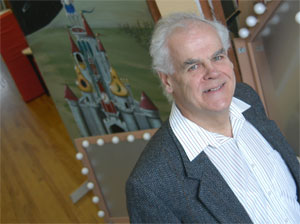 |
| Death and the Maiden director Aubrey Fricker. (Danny Abriel Photo) |
Taking theatre to the community and getting people talking ā those are the objectives of a thought-provoking play coming this week to the university and a downtown location.
Death and the Maiden is co-sponsored by International Development Studies and Broken Leg Act Theatre. The playās director Aubrey Fricker is an alumnus, neighbour of the university and a member of the AV¾ćĄÖ²æ Community Committee.
Dr. Fricker wants to bring the play to audiences because it addresses āmeatyā issues that are a natural for a university audience, accustomed to discussing political events and their repercussions.
|
That question is the moral crux of the play and Dr. Fricker sees it as an opportunity to build in an equally thorny question for those who attend the performances. What are our responsibilities as Canadians for political decisions that are made far way? Recent examples are Romeo Dallaireās failed attempt to get the United Nations to help stop the genocide in Rwanda and the experience of Syrian-born Canadian Maher Arar, who was detained by U.S. officials, interrogated about links to al-Qaeda and sent to Syria where he was tortured and beaten.
Dr. Fricker has enlisted the help of AV¾ćĄÖ²æ professors to give an analysis of the play and to lead a discussion by the audience about these issues. There also will be displays on charts and videos on current events, related to Canadian experience and involvement.
Dr. Fricker says the format is designed to push back boundaries so people can see issues in a new light. He hopes everyone will leave the event āwith their outlook changed permanently
in some way.ā
